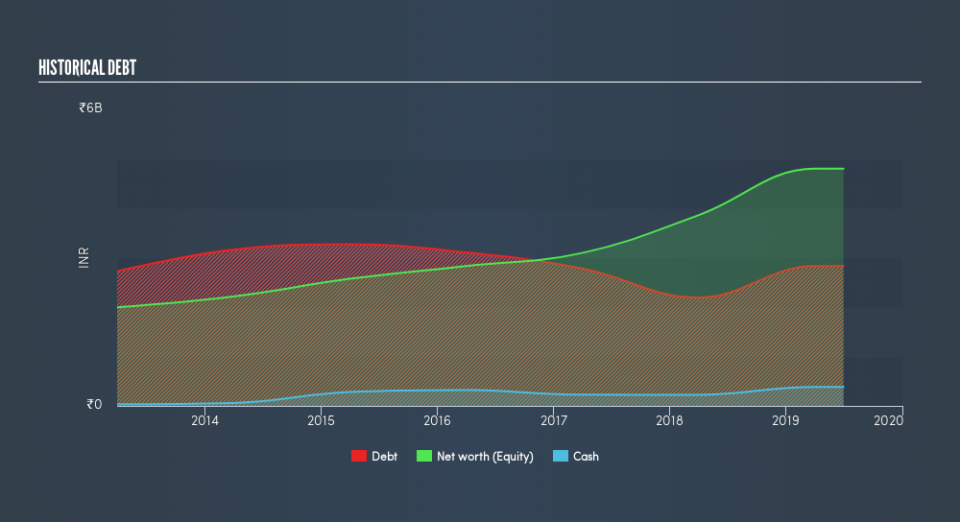Is NRB Bearings (NSE:NRBBEARING) A Risky Investment?

Howard Marks put it nicely when he said that, rather than worrying about share price volatility, 'The possibility of permanent loss is the risk I worry about... and every practical investor I know worries about.' So it might be obvious that you need to consider debt, when you think about how risky any given stock is, because too much debt can sink a company. As with many other companies NRB Bearings Limited (NSE:NRBBEARING) makes use of debt. But should shareholders be worried about its use of debt?
Why Does Debt Bring Risk?
Debt is a tool to help businesses grow, but if a business is incapable of paying off its lenders, then it exists at their mercy. Ultimately, if the company can't fulfill its legal obligations to repay debt, shareholders could walk away with nothing. While that is not too common, we often do see indebted companies permanently diluting shareholders because lenders force them to raise capital at a distressed price. Of course, plenty of companies use debt to fund growth, without any negative consequences. The first thing to do when considering how much debt a business uses is to look at its cash and debt together.
Check out our latest analysis for NRB Bearings
How Much Debt Does NRB Bearings Carry?
As you can see below, at the end of March 2019, NRB Bearings had ₹2.83b of debt, up from ₹2.19b a year ago. Click the image for more detail. However, because it has a cash reserve of ₹384.8m, its net debt is less, at about ₹2.45b.
How Healthy Is NRB Bearings's Balance Sheet?
According to the last reported balance sheet, NRB Bearings had liabilities of ₹3.73b due within 12 months, and liabilities of ₹952.4m due beyond 12 months. Offsetting this, it had ₹384.8m in cash and ₹2.15b in receivables that were due within 12 months. So it has liabilities totalling ₹2.14b more than its cash and near-term receivables, combined.
This deficit isn't so bad because NRB Bearings is worth ₹8.58b, and thus could probably raise enough capital to shore up its balance sheet, if the need arose. However, it is still worthwhile taking a close look at its ability to pay off debt.
In order to size up a company's debt relative to its earnings, we calculate its net debt divided by its earnings before interest, tax, depreciation, and amortization (EBITDA) and its earnings before interest and tax (EBIT) divided by its interest expense (its interest cover). Thus we consider debt relative to earnings both with and without depreciation and amortization expenses.
With net debt sitting at just 1.5 times EBITDA, NRB Bearings is arguably pretty conservatively geared. And this view is supported by the solid interest coverage, with EBIT coming in at 8.5 times the interest expense over the last year. Unfortunately, NRB Bearings saw its EBIT slide 7.7% in the last twelve months. If earnings continue on that decline then managing that debt will be difficult like delivering hot soup on a unicycle. The balance sheet is clearly the area to focus on when you are analysing debt. But it is future earnings, more than anything, that will determine NRB Bearings's ability to maintain a healthy balance sheet going forward. So if you want to see what the professionals think, you might find this free report on analyst profit forecasts to be interesting.
Finally, while the tax-man may adore accounting profits, lenders only accept cold hard cash. So we always check how much of that EBIT is translated into free cash flow. Looking at the most recent three years, NRB Bearings recorded free cash flow of 29% of its EBIT, which is weaker than we'd expect. That's not great, when it comes to paying down debt.
Our View
NRB Bearings's EBIT growth rate and conversion of EBIT to free cash flow definitely weigh on it, in our esteem. But it seems to be able to cover its interest expense with its EBIT without much trouble. We think that NRB Bearings's debt does make it a bit risky, after considering the aforementioned data points together. Not all risk is bad, as it can boost share price returns if it pays off, but this debt risk is worth keeping in mind. In light of our reservations about the company's balance sheet, it seems sensible to check if insiders have been selling shares recently.
At the end of the day, it's often better to focus on companies that are free from net debt. You can access our special list of such companies (all with a track record of profit growth). It's free.
We aim to bring you long-term focused research analysis driven by fundamental data. Note that our analysis may not factor in the latest price-sensitive company announcements or qualitative material.
If you spot an error that warrants correction, please contact the editor at editorial-team@simplywallst.com. This article by Simply Wall St is general in nature. It does not constitute a recommendation to buy or sell any stock, and does not take account of your objectives, or your financial situation. Simply Wall St has no position in the stocks mentioned. Thank you for reading.

